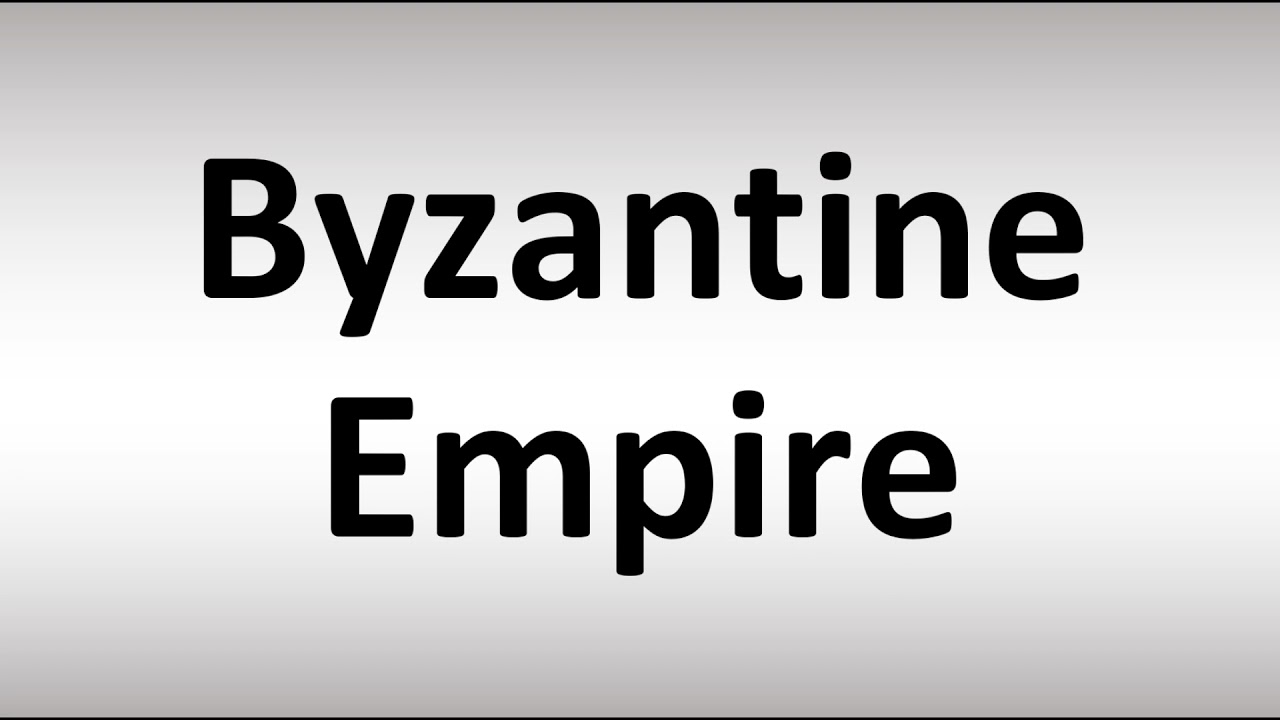Have you ever wondered how to pronounce the name of the Byzantine Empire? Despite its significance in history, its pronunciation can be a bit tricky. Pronounced “biz-an-teen,” this ancient empire was a continuation of the Roman Empire in the eastern part of the Mediterranean. With its rich history and cultural contributions, understanding how to pronounce its name correctly is key to appreciating its legacy.
The Byzantine Empire, also known as the Eastern Roman Empire, spanned over a thousand years, from 330 to 1453 AD. Its capital, Constantinople, was a center of trade, art, and learning. This empire witnessed fascinating political and religious developments, such as the founding of the Eastern Orthodox Church and the Iconoclasm controversy. Mastering the pronunciation of “Byzantine Empire” allows us to engage with this dynamic era and grasp the impact it had on the world.
The pronunciation of the Byzantine Empire is [bɪˈzæntaɪn ˈɛmpaɪər].

Contents
The Origin of Byzantine Empire Name Pronunciation
The pronunciation of the name “Byzantine Empire” has been a subject of debate and confusion for many people. It is not uncommon to come across different pronunciations of this historical state’s name, be it in academic settings or casual conversations. Understanding the origin of the name and its historical context can shed light on the proper pronunciation.
The Byzantine Empire and Its Historical Context
The Byzantine Empire, also known as the Eastern Roman Empire, was the continuation of the Roman Empire in its eastern territories. It emerged as a separate entity after the fall of the Western Roman Empire in 476 CE. The Byzantine Empire was centered around the city of Constantinople (present-day Istanbul) and lasted from the 4th century CE until the Ottoman conquest in 1453 CE.
During its existence, the Byzantine Empire was a major power and played a crucial role in shaping the medieval world. It was known for its rich cultural heritage, sophisticated bureaucracy, strong military, and significant influence on art, architecture, and religion.
The name “Byzantine” was not used during the empire’s actual existence but was later assigned by historians to distinguish it from the earlier Roman Empire. The Byzantine Empire referred to itself as the Roman Empire, considering its cultural and political continuity with the ancient Roman civilization. However, the term “Byzantine Empire” has gained widespread usage in modern times.
The Pronunciation of Byzantine
The pronunciation of “Byzantine” is a matter of linguistic variation and historical interpretation. There are two commonly accepted pronunciations in English-speaking contexts:
- Bi-zuhn-teen: This pronunciation emphasizes the “z” sound in the second syllable, and the stress is placed on the second syllable “teen.” It follows the English language’s phonetic rules and is widely used, especially in academic settings.
- Biz-uhn-tyne: This pronunciation reflects the influence of the Greek language and the authentic Byzantine pronunciation. It emphasizes the “tyne” sound at the end and is closer to the original Greek pronunciation.
Both pronunciations are generally accepted, and the choice may depend on personal preference, regional variations, or the context in which the term is used.
The Historical Context of Pronunciation Variation
The variation in the pronunciation of Byzantine can be attributed to the evolution of the English language and the influence of different linguistic traditions. The English language has undergone significant changes over the centuries, and loanwords from other languages often adapt to the phonetic patterns of English.
In the case of Byzantine, the variation in pronunciation may also stem from the diverse origins of the English vocabulary. The word itself is derived from the Late Latin “Byzantinus,” which comes from the Greek “Byzantion,” referring to the city of Byzantium that preceded Constantinople.
When English borrowed the term, it went through a series of phonetic changes to fit the English language’s phonetic system. This process contributed to the variations in pronunciation.
Choosing the Right Pronunciation
While both pronunciations of Byzantine are acceptable, it is important to consider the context in which the term is used. In academic and formal settings, the pronunciation “Bi-zuhn-teen” is commonly used and ensures clear communication among scholars and experts.
If you are discussing the topic among peers or in a more casual setting, both pronunciations can be used interchangeably. However, using the pronunciation “Bi-zuhn-teen” may help avoid confusion or misunderstandings.
Exploring the Etymology of Byzantine Empire
The pronunciation of the name “Byzantine Empire” is not the only aspect worth exploring. The etymology behind the name itself provides valuable insights into the historical roots and cultural significance of this remarkable empire.
The Origin of the Term Byzantine
The term “Byzantine” used to refer to the Eastern Roman Empire does not have an exact equivalent within the empire’s historical records. The empire considered itself the continuation of the Roman Empire, and its residents referred to it as the Roman Empire.
The name “Byzantine Empire” was coined by later historians who wanted to differentiate this phase of the Roman Empire from its earlier incarnation. The term “Byzantine” was derived from the Greek colony of Byzantium, which served as the empire’s capital once renamed to Constantinople by Emperor Constantine.
The use of the term “Byzantine” in historical scholarship gained popularity in the 16th century, particularly in English-speaking countries, and has endured ever since.
The Empire’s Self-Perception: Roman Identity
It is important to note that the Byzantine Empire considered itself the Roman Empire and its citizens as Romans. The Byzantines believed in their direct connection to the ancient Roman civilization and regarded their empire as the rightful heir to all the glories and achievements of Rome.
The adoption of the name “Byzantine Empire” by later historians reflects the division between the Western and Eastern Roman Empires and highlights the distinct characteristics of the Eastern Roman Empire. However, it is crucial to recognize that the Byzantines themselves did not view their empire as a separate entity but as the continuation of the long-standing Roman civilization.
Understanding this self-perception provides a deeper understanding of the empire’s identity and its significance in both Roman and medieval history.

Pronouncing the Byzantine Empire
The Byzantine Empire was a complex and fascinating civilization that lasted for over a thousand years. Its name is often mispronounced, but with a little guidance, you can master its pronunciation.
The correct pronunciation of “Byzantine” is “bi-ZAN-teen” with the emphasis on the second syllable. It is important to note that the “ti” is pronounced like “sh” in the word “nation.”
The word “Empire” is pronounced as “EM-pier,” with the emphasis on the first syllable and a long “i” sound.
Putting it all together, the correct pronunciation of “Byzantine Empire” is “bi-ZAN-teen EM-pier.”
Remember, it is always helpful to listen to native speakers or professional linguists to perfect your pronunciation. Practice saying the words slowly and accurately until you feel comfortable.
Key Takeaways
- The correct pronunciation of Byzantine Empire is “biz-uhn-teen em-pahy-er.”
- The term Byzantine Empire refers to the Eastern Roman Empire that existed from 330 to 1453 AD.
- The empire was named after its capital city, Byzantium, which later became Constantinople and is now Istanbul.
- The Byzantine Empire was known for its rich culture, art, architecture, and the preservation of classical knowledge.
- The empire played a significant role in the spread of Christianity and the development of the Eastern Orthodox Church.
Frequently Asked Questions
The Byzantine Empire was a significant medieval empire that lasted for over a thousand years. If you’re unsure about how to pronounce its name correctly, we have answers to your questions. Read on to learn more about the pronunciation of Byzantine Empire.
1. How do you pronounce Byzantine Empire?
The correct pronunciation of Byzantine Empire is “bī-zuhn-teen əm-pī(ə)r.” The accent falls on the second syllable, which is pronounced like the word “zen.” The “tine” syllable follows the long “i” sound. The final syllable, “pire,” rhymes with “fire.”
It’s essential to note that the pronunciation may vary slightly depending on regional accents and speech patterns. However, the pronunciation guide provided should give you a good understanding of how to pronounce it correctly.
2. What is the origin of the word Byzantine?
The term “Byzantine” derives from the original Greek name for Constantinople, which was Byzantium. The Byzantine Empire was named after the city, which served as its capital for most of its existence.
The word “Byzantine” entered the English language in the 18th century and has been used to describe the empire ever since. It represents the rich history and cultural legacy of the Eastern Roman Empire.
3. Is there a shorter or alternative way to pronounce Byzantine Empire?
The standard pronunciation “bī-zuhn-teen əm-pī(ə)r” is the most widely accepted and recognized. While it might be tempting to use abbreviations or alternative pronunciations, it is recommended to stick to the standardized pronunciation to ensure accurate communication.
Using alternative pronunciations or abbreviations may lead to confusion, especially when discussing the empire with others who are familiar with its proper pronunciation.
4. Are there any common mispronunciations of Byzantine Empire?
Yes, some common mispronunciations of Byzantine Empire include:
– “by-zan-teen empire”
– “by-zahn-teen empire”
– “by-zan-tyne empire”
– “by-zahn-tyne empire”
It’s essential to note these mispronunciations and avoid using them to ensure accurate communication and understanding when discussing this significant historical empire.
5. Why is the Byzantine Empire’s pronunciation important?
Correctly pronouncing the name of the Byzantine Empire is important for several reasons:
– Enhanced Communication: Pronouncing the name accurately ensures clear communication when discussing the empire’s history, culture, and significance.
– Academic and Professional Considerations: In academic and professional settings, using accurate pronunciation demonstrates knowledge and credibility.
– Respect for History: Pronouncing the name correctly pays respect to the legacy and contributions of the Byzantine Empire, which had a profound impact on world history.
How to Pronounce Byzantine Empire
So, to sum it up, the correct pronunciation of Byzantine Empire is ‘biz-uhn-teen’. It is important to pronounce it correctly, as this ancient empire played a significant role in shaping the history of Europe and the Mediterranean region. Its capital city, Constantinople, was a center of culture, trade, and power.
Understanding how to pronounce Byzantine Empire correctly allows us to have better conversations and discussions about this fascinating period of history. Remember, it’s always great to learn and share knowledge about different historical topics, and proper pronunciation is a small but important part of that learning process. Happy exploring!